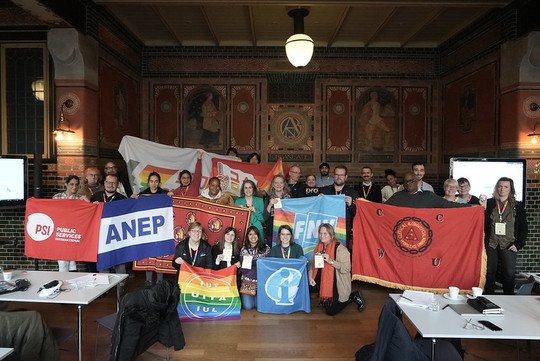The International Federation of Journalists (IFJ), as part of the Council of Global Unions (CGU) Working Group on LGBTI+ rights, took part in the event together with its affiliate, the National Association of Journalists of Perú (ANP).
“LGBTQI+ issues are usually used as a discursive tool to belittle your journalistic work and to belittle your labour rights,” said Graciela Jimena Tiburcio, a representative of ANP. “In general, labour rights in Peru are not usually well protected , and this is definitely reflected in the rights of journalists and, particularly, in LGBTQI+ media workers,” she added.
Trade union representatives from across the world shared best practices and lessons learnt on the path to create more inclusive and discrimination-free workplaces. Discussions highlighted the poor representation of LGBTQI+ members in unions, including in leading roles and the lack of policies to support them in their daily struggle for recognition and support.
“It is vital to ensure that LGBTQI+ workers are represented within trade unions’ structures. Providing training to foster inclusivity in the workplace and elaborate resources, such as conducting surveys or creating communication guidelines, is key to map the situation and give tools to improve it,” said Michele Kessler from the United Food and Commercial Workers International Union (UFCW) in Canada.
The aim of the meeting was to evaluate the work done, identify allies within the trade union movement and beyond, and set strategic objectives for the CGU LGBTI+ Working Group, which promotes LGBTQI+ rights at work at national, regional and international levels.
All participants agreed on the urgency for governments across the world to ratify ILO C190 on harassment and violence at work, a Convention that encompasses the whole world of work and protects all workers irrespective of their status. Moreover, the text makes violence and harassment a health and safety issue, and provides a solid basis for understanding how to prevent gender-based violence and create safe spaces at work, including online.
LGBTQI+rights are human rights. The IFJ firmly believes that every worker is entitled to work free from discrimination and violence regardless of their sexual orientation, gender identity or sex characteristics and encourages its members to bring the issue of equal treatment of all workers in newsrooms to management level through regular consultations with LGBTQI+ workers and strengthened policies on equal rights for all at work.

